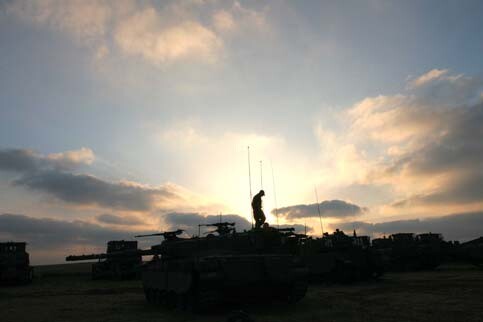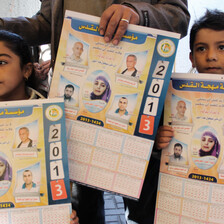Palestine 28 June 2006

Israeli army amasses troops near the border with the Gaza Strip, June 27, 2006. (MaanImages/Moti Milrod)
When I first heard about the Israeli soldier who was “kidnapped” by Palestinians and heard the appeal of Abu Mazen to the Palestinian factions, followed by many other Arab and foreign leaders, calling for his release, I thought that the soldier was kidnapped from a coffee shop in Tel Aviv. This feeling was emphasised when I heard the Israeli army spokesman talking to Al-Jazeera, calling upon the kidnappers to save his life and send him back to his family and parents. I finally realized this was not the case, when I read on the BBC that “the missing man was the gunner on a tank attacked in a pre-dawn raid by militants from a 300 metre tunnel under the Gaza border fence near the Kerem Shalom crossing.” Calling him a “man” and not a “soldier”, however, confused me a bit.
I learned that this soldier/man (not to upset the BBC) was kidnapped in a battle at a military checkpoint inside the green line. Since he is a gunner on a tank, I assume he has participated in shelling Gaza and is probably responsible for the deaths of some civilians, maybe even children and picnickers on the Gaza shoreline.
Israel immediately and as usual blamed the incident on the Palestinian Authority, including the President, although the incident involved the military and not civilians.
The Associated Press wrote: “Despite Abbas’ ongoing efforts to pressure his Hamas rivals into moderation, Olmert said he blamed the entire Palestinian leadership, including the president, responsible for the spiraling violence.”
“It should be clear that we see the Palestinian Authority on all its levels, from the chairman on downward, as the responsible element for this operation and all that happens from it,” Olmert said, referring to Abbas.
Later I found out that the soldier, besides being an Israeli, is also a French citizen. The French government was alerted and announced that they will do their best to save the life of the soldier and bring him back to his beloved family and friends - a French citizen serving in illegally occupied territories violating the Fourth Geneva Convention, to which France is a signatory. I am not sure about the official position of the French government, but as far as I am aware, they usually encourage their citizens not to be in the West Bank or Gaza. So I really cannot understand how the French government can in this case endorse the presence in Gaza of a French citizen who is not there for a picnic, but deliberately violating international law.
I admit that I am a non-violent person. I disagree with all violent activities and don’t believe that any conflict can or should be solved by force and violence. Yet I also fully believe in International Law, which gives occupied people the right to resist their occupiers by all means. Gaza, just like the rest of the West Bank and East Jerusalem, is still under occupation and not liberated, or “contested” as Israel and some media try to say.
Back in 2004, well before Israel’s unilateral disengagement from Gaza took place, the United Nations Commission on Human Rights’ Special Rapporteur on the situation of human rights in the Occupied Palestinian Territories, Prof. John Dugard wrote in his official report to the Commission:
“Israel does not plan to relinquish its grasp on the Gaza Strip. It plans to retain ultimate control over Gaza by controlling its borders, territorial sea and airspace. Consequently, it will in law remain an Occupying Power still subject to obligations under the Fourth Geneva Convention”.
In his latest briefing following his 9-17 June 2006 visit to the Occupied Palestinian Territories, Prof. Dugard wrote:
“Gaza is under siege. Israel controls its airspace and has resumed sonic booms, which terrorize and traumatize its people. The targeted killing of militants is on the increase. Inevitably, as in the past, such killings have resulted in the killing and wounding of innocent bystanders. Israel also controls Gaza’s territorial sea and fires missiles into the territory from ships at sea…Within Gaza, medical services have been seriously affected by the prohibition on the funding of medical equipment and medical supplies managed by the Hamas-led Palestinian Authority. The non-payment of salaries to Palestinian Authority employees has affected both hospitals and schools as employees cannot afford to travel to work. Unemployment and poverty are on the increase. After a long period of closure of the Karni commercial crossing, this crossing has been re-opened but it still processes only a limited number of trucks with the result that Gaza is still short of basic foodstuffs and is unable to export its produce.”
To make matters worse, when a military spokesman was asked by Al-Jazeera whether Israel will stop its planned invasion of Gaza should the soldier be released, he said that these were two different stories. In other words Gaza will be invaded one way or the other. According to Israeli daily, Yediot Ahronot, the invasion of Gaza was planned much earlier than the kidnapping of the soldier. This means not only will child prisoners not be released in exchange for the soldier’s life, but more children will most likely be killed in the coming invasion.
Thus, the Palestinian president and the other regional and international leaders are in effect asking for the release of the soldier but at the same time for Gazans to prepare themselves for a widespread Israeli invasion. The message is that Palestinians should not resist - they should just wait for the Israelis in their homes, schoolyards and on the streets, ready to die. Palestinians should not defend themselves or defend their children; they simply need to wait to be killed without resistance because any resistance, even if it comes from a victim, is an act of terror.
Meanwhile, Associated Press and Reuters wrote:
“… the soldier’s family broke its silence on Monday to plead with his captors to treat him humanely and to remember he has a loving family who misses him dearly. Noam Shalit, in an interview with Associated Press Television, described his son as a quiet, helpful boy who followed his older brother into the military’s armored corps. ‘The only thing we have left right now is hope, nothing more,’ he said.”
Reading these heartbreaking lines pushed me to compare this with what a Palestinian mother had said on Al-Jazeera, following a recent shelling by Israel, when she stated that the very concept of hope has been erased from her consciousness.
What the Shalit family is feeling now is exactly how most Palestinian families are feeling or have felt at one time. All Israelis need to know that. They need to know that Palestinians are humans just like them. Palestinians mourn when their children are killed and they feel desperate when their children are imprisoned. This vicious cycle of violence needs to be stopped. Israel should end its occupation for once and for ever and not leave any outstanding issues as it usual does. They should fully withdraw from Gaza and the West bank including East Jerusalem and give the Palestinians their political and economic rights. Israelis need to give Palestinians the chance to live next to them in prosperity and peace – a just peace.
Kidnapping an Israeli soldier will not bring us one inch closer to peace, yet neither will Israeli revenge attacks, pre-emptive attacks or collective punishment, like cutting food supplies, electricity or water. The only Israeli logical response which would satisfy the Shalit family and other bereaved Israeli and Palestinian families would be to end the occupation. The time is now. The time has always been now – Israel, when will you learn?
Rifat Odeh Kassis is a Palestinian human rights activist and president of Defense for Children International.
[NEXT]
Related Links





